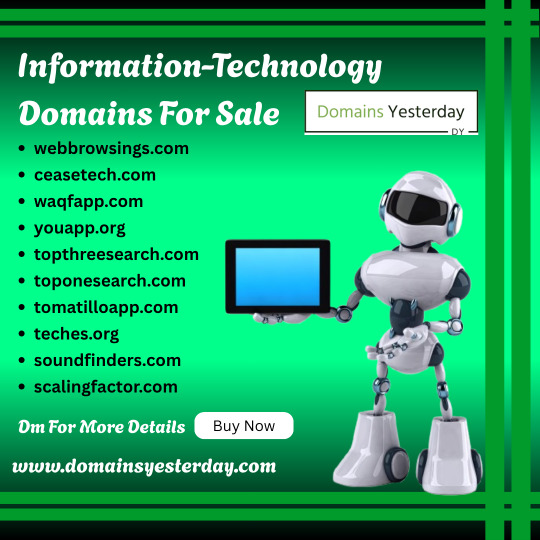#techconsulting
Explore tagged Tumblr posts
Text
𝐓𝐨𝐩 5 𝐅𝐮𝐭𝐮𝐫𝐢𝐬𝐭𝐢𝐜 𝐒𝐢𝐝𝐞 𝐇𝐮𝐬𝐭𝐥𝐞𝐬 𝐟𝐨𝐫 𝐓𝐞𝐜𝐡𝐢𝐞𝐬 𝐢𝐧 2025
In today’s fast-paced tech world, side hustles can be a fantastic way for professionals to boost their skills and earn extra income. With advancements in artificial intelligence, remote working, and a growing need for tech solutions, 2025 is filled with exciting possibilities for tech enthusiasts.
This post dives into five promising side hustles, supported by data and trends. Techies can capitalize on their expertise and thrive in these areas.
1. Remote IT Support
With businesses shifting to hybrid work models, the demand for remote IT support has skyrocketed. According to a report from the International Data Corporation (IDC), the global IT services market is set to hit $1 trillion by 2025, hinting at tremendous opportunities in this field.
Techies with skills in troubleshooting can offer services to both businesses and individuals. The TechServe Alliance notes that the demand for IT support roles surged over 10% last year, making this a vibrant market.
Starting a remote IT support hustle is easy. Freelancing platforms like Upwork and Fiverr allow techies to find clients quickly. Depending on the complexity of the service, they can earn between $25 and $150 per hour while enjoying the flexibility to work on their own schedule.
2. Cybersecurity Consulting
As cyber threats evolve, companies increasingly prioritize cybersecurity. A report from Cybersecurity Ventures predicts that costs from cybercrime could reach $10.5 trillion annually by 2025. This statistic underscores the growing need for cybersecurity professionals.
Techies with experience in cybersecurity can offer their services to businesses looking to protect sensitive data. A survey by Proofpoint found that 55% of organizations fended off phishing attacks, indicating a strong demand for seasoned professionals.
In this consulting niche, technology experts can earn between $100 and $500 per hour, based on their experience and project complexity. Earning certifications, like the Certified Information Systems Security Professional (CISSP), can significantly boost credibility and income potential.
Minimize image
Edit image
Delete image

3. Software Development and Mobile App Creation
As the world becomes more mobile-first, demand for software and app development is expected to rise. Statista reports that the global app economy may generate over $407.31 billion in revenue by 2026, presenting a lucrative chance for techies skilled in coding.
Developers can enter this space through freelancing or by launching their own projects. Tools like React Native and Flutter allow for efficient cross-platform application development, saving both time and resources.
Freelancers can charge between $50 and $200 per hour based on expertise and project scope. For those willing to turn a side hustle into a full business, the income from app sales and in-app purchases can be enormous.
4. Data Analysis and Visualization
Data remains one of the most valuable assets today, with analytics aiding decision-making. The global data analytics market might reach $300 billion by 2026, creating fertile ground for techies skilled in data analysis.
Freelance data analysts can help companies extract valuable insights from their data. Utilizing tools like Tableau, Power BI, and R can help create compelling visualizations, making their services even more attractive.
Data analysts typically charge between $40 and $150 per hour depending on analysis complexity. Mastering data storytelling enables techies to transform raw data into practical insights, positioning themselves as key assets for businesses.
5. E-Learning Course Creation
The rapid growth of online learning has made creating and selling e-learning courses a sought-after side hustle. The global e-learning market is anticipated to reach $375 billion by 2026, driven by rising demand for skill development.
Techies can harness their knowledge to develop courses on platforms like Udemy or Teachable. Topics can range from programming languages to software tools and emerging technologies, such as AI and machine learning. Statista reported that 42% of online course creators are tech professionals, showing the market's strong bias toward technical education.
Successful courses can generate substantial passive income, sometimes yielding thousands of dollars. Since course creation has low overhead, techies can concentrate on producing high-quality content and devising effective marketing strategies.
Minimize image
Edit image
Delete image

Unlocking New Opportunities in Tech
The side hustles mentioned offer exciting paths for tech-savvy individuals aiming to enhance their skills and income in 2025.
As technology keeps evolving, the need for skilled professionals in IT support, cybersecurity, software development, data analysis, and e-learning will continue to grow.
By leveraging their expertise and using the right platforms, techies can build rewarding side hustles that provide financial perks and opportunities for personal and career growth.
Whether solving challenging problems for clients, creating innovative apps, or imparting knowledge, the potential for side hustles in the tech sector is vast. The key is to find a niche that aligns with personal interests, engage in continuous learning, and embrace the entrepreneurial spirit in this dynamic environment.
In a landscape where technology is at the center of everyday life, techies hold a unique position to lead future innovations. Engaging in these side hustles will not only keep them relevant but also equip them for the challenges and opportunities that lie ahead.
#TechSideHustles#RemoteITSupport#Cybersecurity#SoftwareDevelopment#DataAnalysis#MobileAppDevelopment#Elearning#Freelancing#TechEntrepreneur#FreelanceLife#TechProfessionals#FutureOfWork#TechOpportunities#DigitalTransformation#AI#DataVisualization#Coding#TechConsulting#OnlineLearning#CareerGrowth#TechSkills
2 notes
·
View notes
Text

🚀 Unlock Your Business's Full Digital Potential with Akkenna Animations and Technologies! 🌐
Is your business ready to leap into the digital age? Look no further! At Akkenna Animations and Technologies, we offer top-notch IT consulting services to help you thrive in the digital landscape. 💻
Experience seamless operations and increased productivity. Get in touch with us today and let's elevate your business together!
Let's chat! 📲 +91 74185 55205 Explore more at https://www.akkenna.com/ and start shaping your vision.
#ITConsulting#DigitalTransformation#BusinessSuccess#SoftwareSolutions#TechConsulting#SoftwareExperts#ITStrategy#Innovation#TechSupport#BusinessTech#AkkennaTech
2 notes
·
View notes
Text
Unlock CRM Performance with a Free Salesforce Audit + CPQ Review from a Trusted Salesforce Consulting Company
Looking for a proven way to identify what’s slowing down your Salesforce CRM? 🛠️ AwsQuality — a top-tier Salesforce Consulting Company — is now offering a FREE Salesforce Audit + CPQ Review to help you streamline your sales pipeline, reduce CPQ delays, and improve ROI.
With certified Salesforce experts available 24/7, we provide tailored insights that help businesses in the UK, USA, Dubai, and beyond achieve CRM excellence — at no cost.
🚀 Why it matters:
Uncover hidden CRM bottlenecks
Optimize CPQ performance
Maximize lead-to-cash workflows
Get expert recommendations — all for FREE!
👉 Book your audit now at www.awsquality.com or email [email protected].
Anchor Text Suggestion:
Salesforce Consulting Company
Free Salesforce Audit
CPQ Review Services
CRM Optimization Experts
Salesforce Partner in Dubai / USA / UK
#SalesforceConsultingCompany#FreeSalesforceAudit#CPQOptimization#SalesforceCRM#BusinessAutomation#CRMSolutions#AwsQuality#DigitalTransformation#TechConsulting#SalesforceExperts#CustomerSuccess#CRMStrategy#B2BMarketing#LeadToCash#SalesOps
0 notes
Text

🚀 Choosing the Right Software in 2025: Custom vs. Off-the-Shelf
The software you choose today could shape your business success tomorrow. Whether you're scaling a startup or transforming an enterprise, making the right choice can impact everything — from efficiency and productivity to customer satisfaction and ROI.
📈 Looking for scalability, flexibility, and long-term value? 🤔 Confused between custom-built solutions and off-the-shelf tools?
You’re not alone.
✅ Our expert guide lays it all out:
The pros and cons of each approach
Real-world use cases across industries
Hidden costs, ROI impact, and scaling potential
🧠 Choosing between custom software and off-the-shelf solutions can define your business’s future.
In 2025, staying competitive means using the right technology—tailored to your unique goals and growth plans.
📘 Explore the full guide now or 💬 Get a FREE consultation with our tech experts today to discover what’s right for your business!
🔗 Link in bio
#CustomSoftware#OffTheShelfSolutions#BusinessGrowth2025#TechConsulting#SoftwareDevelopment#CQLsys#MobileAppDevelopment#WebDevelopment#SoftwareStrategy#FutureReady
0 notes
Text
Beyond the Pipeline: Choosing the Right Data Engineering Service Providers for Long-Term Scalability
Introduction: Why Choosing the Right Data Engineering Service Provider is More Critical Than Ever
In an age where data is more valuable than oil, simply having pipelines isn’t enough. You need refineries, infrastructure, governance, and agility. Choosing the right data engineering service providers can make or break your enterprise’s ability to extract meaningful insights from data at scale. In fact, Gartner predicts that by 2025, 80% of data initiatives will fail due to poor data engineering practices or provider mismatches.
If you're already familiar with the basics of data engineering, this article dives deeper into why selecting the right partner isn't just a technical decision—it’s a strategic one. With rising data volumes, regulatory changes like GDPR and CCPA, and cloud-native transformations, companies can no longer afford to treat data engineering service providers as simple vendors. They are strategic enablers of business agility and innovation.
In this post, we’ll explore how to identify the most capable data engineering service providers, what advanced value propositions you should expect from them, and how to build a long-term partnership that adapts with your business.
Section 1: The Evolving Role of Data Engineering Service Providers in 2025 and Beyond
What you needed from a provider in 2020 is outdated today. The landscape has changed:
📌 Real-time data pipelines are replacing batch processes
📌 Cloud-native architectures like Snowflake, Databricks, and Redshift are dominating
📌 Machine learning and AI integration are table stakes
📌 Regulatory compliance and data governance have become core priorities
Modern data engineering service providers are not just builders—they are data architects, compliance consultants, and even AI strategists. You should look for:
📌 End-to-end capabilities: From ingestion to analytics
📌 Expertise in multi-cloud and hybrid data ecosystems
📌 Proficiency with data mesh, lakehouse, and decentralized architectures
📌 Support for DataOps, MLOps, and automation pipelines
Real-world example: A Fortune 500 retailer moved from Hadoop-based systems to a cloud-native lakehouse model with the help of a modern provider, reducing their ETL costs by 40% and speeding up analytics delivery by 60%.
Section 2: What to Look for When Vetting Data Engineering Service Providers
Before you even begin consultations, define your objectives. Are you aiming for cost efficiency, performance, real-time analytics, compliance, or all of the above?
Here’s a checklist when evaluating providers:
📌 Do they offer strategic consulting or just hands-on coding?
📌 Can they support data scaling as your organization grows?
📌 Do they have domain expertise (e.g., healthcare, finance, retail)?
📌 How do they approach data governance and privacy?
📌 What automation tools and accelerators do they provide?
📌 Can they deliver under tight deadlines without compromising quality?
Quote to consider: "We don't just need engineers. We need architects who think two years ahead." – Head of Data, FinTech company
Avoid the mistake of over-indexing on cost or credentials alone. A cheaper provider might lack scalability planning, leading to massive rework costs later.
Section 3: Red Flags That Signal Poor Fit with Data Engineering Service Providers
Not all providers are created equal. Some red flags include:
📌 One-size-fits-all data pipeline solutions
📌 Poor documentation and handover practices
📌 Lack of DevOps/DataOps maturity
📌 No visibility into data lineage or quality monitoring
📌 Heavy reliance on legacy tools
A real scenario: A manufacturing firm spent over $500k on a provider that delivered rigid ETL scripts. When the data source changed, the whole system collapsed.
Avoid this by asking your provider to walk you through previous projects, particularly how they handled pivots, scaling, and changing data regulations.
Section 4: Building a Long-Term Partnership with Data Engineering Service Providers
Think beyond the first project. Great data engineering service providers work iteratively and evolve with your business.
Steps to build strong relationships:
📌 Start with a proof-of-concept that solves a real pain point
📌 Use agile methodologies for faster, collaborative execution
📌 Schedule quarterly strategic reviews—not just performance updates
📌 Establish shared KPIs tied to business outcomes, not just delivery milestones
📌 Encourage co-innovation and sandbox testing for new data products
Real-world story: A healthcare analytics company co-developed an internal patient insights platform with their provider, eventually spinning it into a commercial SaaS product.
Section 5: Trends and Technologies the Best Data Engineering Service Providers Are Already Embracing
Stay ahead by partnering with forward-looking providers who are ahead of the curve:
📌 Data contracts and schema enforcement in streaming pipelines
📌 Use of low-code/no-code orchestration (e.g., Apache Airflow, Prefect)
📌 Serverless data engineering with tools like AWS Glue, Azure Data Factory
📌 Graph analytics and complex entity resolution
📌 Synthetic data generation for model training under privacy laws
Case in point: A financial institution cut model training costs by 30% by using synthetic data generated by its engineering provider, enabling robust yet compliant ML workflows.
Conclusion: Making the Right Choice for Long-Term Data Success
The right data engineering service providers are not just technical executioners—they’re transformation partners. They enable scalable analytics, data democratization, and even new business models.
To recap:
📌 Define goals and pain points clearly
📌 Vet for strategy, scalability, and domain expertise
📌 Watch out for rigidity, legacy tools, and shallow implementations
📌 Build agile, iterative relationships
📌 Choose providers embracing the future
Your next provider shouldn’t just deliver pipelines—they should future-proof your data ecosystem. Take a step back, ask the right questions, and choose wisely. The next few quarters of your business could depend on it.
#DataEngineering#DataEngineeringServices#DataStrategy#BigDataSolutions#ModernDataStack#CloudDataEngineering#DataPipeline#MLOps#DataOps#DataGovernance#DigitalTransformation#TechConsulting#EnterpriseData#AIandAnalytics#InnovationStrategy#FutureOfData#SmartDataDecisions#ScaleWithData#AnalyticsLeadership#DataDrivenInnovation
0 notes
Text
💡 sursaritatechknow.com is available!
Perfect for a tech blog, consulting firm, or IT services business. Unique, niche-focused, and easy to brand.
🔗 Grab it now: www.godaddy.com/en-uk/domainsearch/find?domainToCheck=sursaritatechknow.com
0 notes
Text
IT Consulting Services That Power Your Business

Accelerate your growth with expert IT consulting services tailored to your unique business goals. From digital strategy to security and cloud solutions—we deliver innovation that drives success.
#ITConsulting#DigitalTransformation#TechConsulting#CloudSolutions#CyberSecurity#BusinessITSupport#ITStrategy
0 notes
Text
0 notes
Text
Canadian Businesses: Time to Go Digital and Thrive!
The future belongs to businesses that embrace change — and for Canadian companies, digital transformation is the key to unlocking that future. As technology covert industries at lightning speed, those who invest in smart digital strategies gain a powerful edge. It’s not just about keeping up; it’s about leading the way toward innovation, efficiency, and lasting success.
At Haya Solutions, we specialize in guiding Canadian businesses through their digital transformation journeys. Our expert consultants work closely with you to understand your unique challenges and design tailored strategies that modernize operations, automate workflows, and improve customer experiences.
Digital transformation is more than just update technology — it’s about reshaping how your business operates, delivers value, and competes. By adopting cloud solutions, leveraging data analytics, and enhancing communication channels, your business becomes more agile and responsive to market demands.
Choosing digital transformation consulting means investing in your company’s future growth and sustainability. With Haya Solutions, you gain a trusted partner who understands the Canadian market and delivers proven strategies to help your business thrive.
Ready to take the leap and accelerate your growth? Discover how our Digital Transformation Consulting Services can empower your business to succeed in the digital age.
0 notes
Text
Expert NetSuite Consulting | NetSuite ERP Consultants | AGSuite Technologies
AGSuite Technologies offers expert NetSuite Consulting to help businesses streamline operations, boost ROI, and achieve digital transformation with customized NetSuite solutions.
#NetSuiteConsulting#NetSuiteServices#TechConsulting#NetSuiteSupport#ERPConsulting#AGSuiteTechnologies
0 notes
Text







💻 Power Up the Future with Information Technology Domains!
Claim a cutting-edge IT domain that positions your brand at the heart of innovation, software, cloud services, cybersecurity, or tech consulting. Perfect for startups, agencies, SaaS, and IT blogs.
✨ Tech-forward & professional ✨ Builds instant authority in the IT world ✨ Ideal for digital products, services, or thought leadership
#InformationTechnology#ITDomain#TechStartups#CloudSolutions#CyberSecurity#SaaS#DigitalInnovation#TechConsulting#PremiumDomains#FutureReady
0 notes
Text

Unlock Your Business Potential with AI Consulting
Boost efficiency and drive innovation with expert AI consulting from Osiz Technologies. Discover tailored AI solutions designed to help your business grow smarter and faster.
Discover More:- https://www.osiztechnologies.com/ai-consulting-services
#AIConsultingServices#ArtificialIntelligence#BusinessInnovation#AIDevelopment#DigitalTransformation#MachineLearning#AIForBusiness#TechConsulting#SmartSolutions
0 notes
Text
Responsive Web App UI by NineStack
A sleek, user-friendly web application interface developed by NineStack. Our team builds scalable, modern applications tailored to client needs using the latest frameworks. URL: https://ninestack.com

0 notes
Text
The Hidden UX Mistakes in Most ERP Implementations
ERP systems are powerful engines for business transformation—but only when implemented with the end-user in mind. Many organizations across the USA, particularly in fast-moving markets like Chicago, invest heavily in ERP technology but overlook a critical component: User Experience (UX).
A poorly designed ERP interface frustrates employees, reduces adoption, and ultimately slows down ROI. Based on insights and implementation practices from Avion Technology, here are the most common UX mistakes—and how to avoid them.

✅ 1. Designing for Software, Not for People
ERP systems are often designed from a technical or executive perspective, rather than based on how users actually work.
This disconnect leads to poor usability, low adoption, and excessive support requests.
Avion Technology’s custom ERP solutions are built around the end-user—through requirement gathering, persona development, and agile iterations—ensuring that business logic meets human logic.
✅ 2. Cramming Too Many Features Into One Dashboard
ERP platforms often try to do everything at once, overwhelming users with excessive tools and irrelevant screens.
Especially in Chicago-based companies with distributed teams, this leads to bottlenecks in navigation and data entry.
Avion Technology simplifies ERP UI/UX by customizing interfaces, streamlining navigation, and minimizing friction—helping users accomplish tasks in fewer clicks.
✅ 3. Skipping Mobile Optimization
Modern teams need access on-the-go. Yet many ERP systems still fail to offer mobile-friendly interfaces.
This is a huge loss for sectors like logistics, healthcare, or service management across the USA, where mobility is essential.
Avion builds responsive, mobile-first ERP experiences so users can track inventory, approve workflows, or pull reports—right from their phone.
✅ 4. Minimal User Training and Post-Go-Live Support
Many companies stop user engagement once the system is live. But successful ERP rollouts need ongoing adoption strategies.
For growing teams in places like Chicago, changes in workforce and processes demand continual education.
Avion supports long-term ERP success through tailored user training, on-demand guides, and process-based documentation that evolve with your business.
✅ 5. No User Testing Before Go-Live
Skipping real-world usability testing leads to costly rework, low satisfaction, and employee pushback.
Avion conducts thorough user testing cycles during ERP implementation, incorporating feedback from various departments to ensure seamless usability from day one.
✅ 6. Ignoring Department-Specific Workflows
Not every team needs the same dashboard or module layout.
Without role-based customization, ERP systems become cluttered and inefficient.
Avion specializes in modular ERP systems that adapt to the unique workflows of sales, finance, HR, and operations—empowering each department to work smarter.
🔚 Conclusion
In today’s digital-first economy, an ERP system isn’t just a backend tool—it’s a daily workspace. If that workspace frustrates your team, you’re losing time, money, and morale. Businesses in Chicago and across the USA can no longer afford clunky ERP systems that hinder more than they help.
Avion Technology helps you implement ERP systems with usability at the core—from intuitive design to real-time mobile access and personalized dashboards. Because when your team enjoys using the system, your business enjoys better results.
👉 Ready to fix the friction in your ERP system? Partner with Avion Technology for user-first ERP implementation that turns your investment into real productivity.
FAQs on ERP UX & Implementation
1. Why do most ERP implementations fail?
Poor user experience and lack of employee adoption are top reasons ERP projects fall short, even if the system itself is robust.
2. How can I improve ERP UX for my team?
Prioritize real user workflows, conduct UX testing, simplify interfaces, and provide continuous training. Partnering with an expert ERP provider like Avion Technology ensures all of this is baked into your implementation.
3. Is mobile ERP necessary for companies in the USA?
Absolutely. With hybrid work models and on-site operations, mobile-first ERP systems are essential—especially for businesses across major hubs like Chicago.
4. How long does it take to implement a user-focused ERP?
Implementation varies by complexity, but with agile methods and the right partner, companies can go live in 3–9 months with strong user adoption from day one.
5. Can ERP systems be customized by user roles?
Yes. Avion Technology specializes in role-based dashboards and department-specific modules to ensure users see exactly what they need—and nothing they don’t.
Ready to make ERP your competitive advantage? Talk to the experts at Avion Technology and discover how a user-first ERP solution can transform your business operations—faster, smarter, and more intuitively.
#ERPImplementation#UserExperience#DigitalTransformation#ERPSystems#ERPFailure#CustomERP#EnterpriseSoftware#ProcessOptimization#BusinessEfficiency#SoftwareAdoption#ChicagoBusiness#ChicagoTech#USAEnterprises#MidwestBusiness#AvionTechnology#ERPConsulting#TechConsulting#EnterpriseUX#SaaS#B2BSolutions
0 notes
Text
Real people. Real tools. Real results. That’s TDZ Pro.
1 note
·
View note
Text
Unlocking the Full Potential of Agentic AI Consulting Companies: Advanced Strategies, Real Impact
Introduction: Why You Can’t Ignore Agentic AI Anymore
What if your software could not just follow instructions, but make decisions, take initiative, and act autonomously in your best interest?
This is the promise of Agentic AI — a new class of artificial intelligence that behaves more like agents than tools. And now, Agentic AI consulting companies are helping organizations bridge the gap between concept and impact.
Yet here’s the problem: many businesses are either underutilizing these services or struggling to align them with real-world ROI. It’s not about understanding what Agentic AI is anymore. It’s about making it work effectively and responsibly inside your workflows, operations, and revenue models.
In this post, we’re going beyond the hype. You’ll learn:
How Agentic AI consulting companies deliver real value
What roadblocks most companies face when integrating agentic systems
Tactical strategies to maximize ROI with consulting partners
Red flags to watch for when selecting a consulting firm
And powerful use cases that showcase measurable business transformation
Let’s dive in.
1. The Real-World Shift to Autonomous AI: Why Agentic AI Consulting Companies Matter Now
We’re entering an era where autonomous agents can:
Coordinate logistics in supply chains without human prompts
Perform multi-step customer service resolutions
Proactively optimize financial operations or security postures
But transitioning to autonomous decision-making isn’t just technical—it’s cultural, operational, and deeply strategic. That’s where Agentic AI consulting companies come in.
They act as translators between AI capabilities and business outcomes. And more than that, they serve as architects for embedding autonomous agents in secure, scalable, and ethical ways.
Common roadblocks they help solve:
Lack of in-house expertise to build or deploy agentic systems
Data silos that prevent agents from making high-quality decisions
Legal and ethical concerns about decision autonomy
Fear of losing control or introducing risk
Key takeaway: Agentic AI consulting companies don’t just build tech—they build trust, alignment, and accountability frameworks for AI agents inside your business.
2. What to Expect When Working With Agentic AI Consulting Companies
To make agentic systems actually work, consultants follow a rigorous, multi-phase journey:
Phase 1: Discovery and Feasibility Mapping
Define target processes or domains where autonomous decision-making can deliver the most value
Assess current AI maturity, data readiness, and organizational appetite for automation
Phase 2: Architecture and Agent Design
Design specialized agents: financial advisors, compliance auditors, customer success agents, etc.
Identify external APIs, LLMs, or proprietary tools that agents will orchestrate
Phase 3: Safe Testing in Controlled Environments
Set up sandboxes with defined rules and rollback capabilities
Simulate agent behavior with synthetic or historical data
Phase 4: Integration and Deployment
Embed agents into CRMs, ERPs, or internal platforms
Define human-in-the-loop checkpoints and escalation procedures
Phase 5: Monitoring, Governance, and Feedback Loops
Real-time metrics: action accuracy, resolution time, error rate
Behavioral audits to ensure agents align with business logic and brand tone
Key takeaway: Working with Agentic AI consulting companies is a strategic partnership—not a one-off project.
3. Maximizing ROI With Agentic AI Consulting Companies: 5 High-Leverage Moves
To get real ROI from agentic AI, you need more than technology. You need alignment across goals, processes, and people.
Try these five high-leverage moves:
Start with high-friction, low-judgment tasks: Automate decision-heavy but risk-low areas like scheduling, knowledge retrieval, or claims processing.
Pair agents with KPIs from day one: Your Agentic AI consulting firm should align agents with metrics that matter: CSAT, MRR, churn, etc.
Design for explainability: Insist that every agent’s decision can be traced and audited. This improves trust across internal teams.
Create cross-functional AI councils: Align legal, IT, ops, and product teams in approving and overseeing agent behavior.
Demand sandboxing and failure simulations: Test agents in controlled environments to understand edge-case behaviors before deploying live.
Key takeaway: Agentic AI is not about replacing humans. It’s about amplifying high-impact areas of your business.
4. Red Flags to Watch for When Choosing Agentic AI Consulting Companies
Not all Agentic AI consulting companies are created equal. Here are warning signs to avoid:
They promise plug-and-play agents with no customization. Agentic systems need tuning to your context, data, and constraints.
No clear governance framework or escalation plans. Without accountability models, autonomous systems can drift from objectives.
Too much black-box modeling. Transparency is key. If they can’t explain how the agent reasons, that’s a liability.
No legal or compliance fluency. Deploying agents without understanding GDPR, HIPAA, or audit requirements is risky.
They treat agent development like traditional software development. Agents evolve. Consultants must understand prompt engineering, RLHF (reinforcement learning from human feedback), and continuous model refinement.
Checklist for evaluating Agentic AI consulting companies:
Do they offer domain-specific use cases?
Can they demo previous agent deployments?
Do they have a post-deployment governance plan?
Are they tech-agnostic or vendor-locked?
Do they provide staff training and change management?
Key takeaway: The best Agentic AI consulting companies operate like AI venture builders—strategic, lean, and long-term.
5. Future-Proofing With Agentic AI: Use Cases That Are Changing the Game
Here’s where the magic happens. Let’s look at industries already transforming thanks to Agentic AI consulting companies:
Financial Services:
Portfolio agents adjusting investment strategies in real-time based on risk appetite
Fraud detection agents proactively flagging suspicious transactions
Healthcare:
Virtual clinical trial agents managing patient logistics, consent forms, and follow-ups
Diagnosis agents supporting doctors with real-time suggestions based on symptom input
Customer Service:
Tier-1 support agents resolving queries without escalation
Loyalty agents identifying upsell or churn-risk moments and intervening instantly
Supply Chain:
Logistics agents re-routing shipments in real-time based on weather, cost, or port delays
Procurement agents negotiating with suppliers based on historical deals
Retail & E-commerce:
Merchandising agents testing promotions, layouts, and messaging in real-time
Personal shopping agents curating bundles and offers based on behavioral signals
Key takeaway: With the right consulting partner, agentic systems can evolve from helpers to profit-driving collaborators.
Conclusion: The Future Belongs to the Companies Who Get Agentic AI Right
Agentic AI isn’t coming. It’s here. And those who wait for a perfect playbook will lose ground to competitors already experimenting, learning, and scaling.
Whether you’re looking to build your first autonomous agent or scale an existing system, partnering with the right Agentic AI consulting company can de-risk innovation and accelerate growth.
Here’s what you can do next:
Audit internal workflows to find friction-rich areas agents could improve
Interview at least three Agentic AI consulting companies with domain expertise
Request a sandbox proof of concept before full-scale deployment
Build internal readiness with training and governance playbooks
The future of AI isn’t just generative—it’s agentic. And now is the time to lead, not lag.
#AgenticAI#AgenticAIConsulting#AIConsultingServices#AgenticAICompanies#AgenticIntelligence#AIConsultingFirms#EnterpriseAI#AgenticSolutions#AIForBusiness#GenerativeAIConsulting#ArtificialIntelligence#GenerativeAI#MachineLearning#AITransformation#AIAdoption#FutureOfAI#DigitalTransformation#IntelligentAutomation#AIAgents#AIInnovation#TechStrategy#BusinessTransformation#DataDrivenDecisions#TechConsulting#AIForEnterprises#CIOInsights#B2BMarketing#TechLeadership#DigitalStrategy#EnterpriseSolutions
0 notes